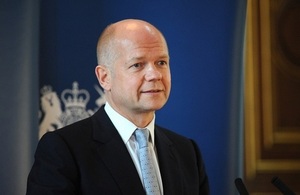Reducing corruption and increasing transparency are vital for global stability and prosperity
A joint statement on the importance of International Anti-Corruption Day.

Foreign Secretary William Hague
Foreign Secretary William Hague, UK International Anti-Corruption Champion Ken Clarke and International Development Secretary Justine Greening issued a joint statement on the importance of International Anti-Corruption Day.
Reducing corruption and increasing transparency are vital for improving global stability and prosperity. 2013 also marks the 10 year anniversary of the passage of the United Nations Convention Against Corruption, a standard which we encourage the international community to champion.
The Foreign Secretary said: “Reducing corruption and increasing transparency is at the heart of this Government’s agenda. Through our Presidency of the G8 this year, the UK has secured a landmark agreement to promote tax transparency, tackle the misuse of ownership and legal arrangements by large companies, and announced plans for a UK register of beneficial ownership.
“Last week’s announcement by Transparency International that the UK had improved in the Corruption Perceptions Index was welcome news and reflects the work this Government has been doing to tackle corruption both in this country and abroad.”
Ken Clarke added: “I am proud that the Government have brought in the Bribery Act, a world-leading piece of legislation setting out a modern scheme of bribery offences in the UK and overseas and already giving rise to convictions.
“In my capacity as the UK Government’s Anti-Corruption Champion I am looking forward to working across Government to tackle efforts by those who launder the proceeds of corruption through the UK financial system. We are already pursuing money stolen in the Arab Spring countries.
“There is more to do, however, if we are to raise our standing at home and reduce corruption overseas. The establishment of the National Crime Agency will help continue this important work, as set out in the Serious and Organised Crime Strategy we have recently published. We must also continue to raise international awareness about our strong and comprehensive Bribery Act.”
International Development Secretary Justine Greening added: “When corruption happens in developing countries, it is the very poorest people who foot the bill. It deters investment, cheats citizens out of the services and support they need to develop their economies and end aid dependency.
“Stamping out corruption, fraud, money laundering and tax evasion is a vital part of our work. We are tackling the root causes and will support Britain’s world class police units to bring the culprits to justice.”
The UK’s Department for International Development (DFID) has programmes in place to help tackle endemic corruption, fraud and misuse of public funds in 29 priority countries.
In addition, DFID funds specialist units in the Metropolitan Police, City of London Police, the Crown Prosecution Service and the Serious Organised Crime Agency to stop foreign or UK criminals from benefitting from corrupt practices in developing countries. Since 2006 over £100 million of assets have been restrained, confiscated or forfeited, and just under £14 million has been returned to developing countries.
For further information, please contact the British Embassy Communications Manager, Ms Dinh Thu Huong, Tel. 3936 0500 ext 2227; email: dinh.huong@fco.gov.uk